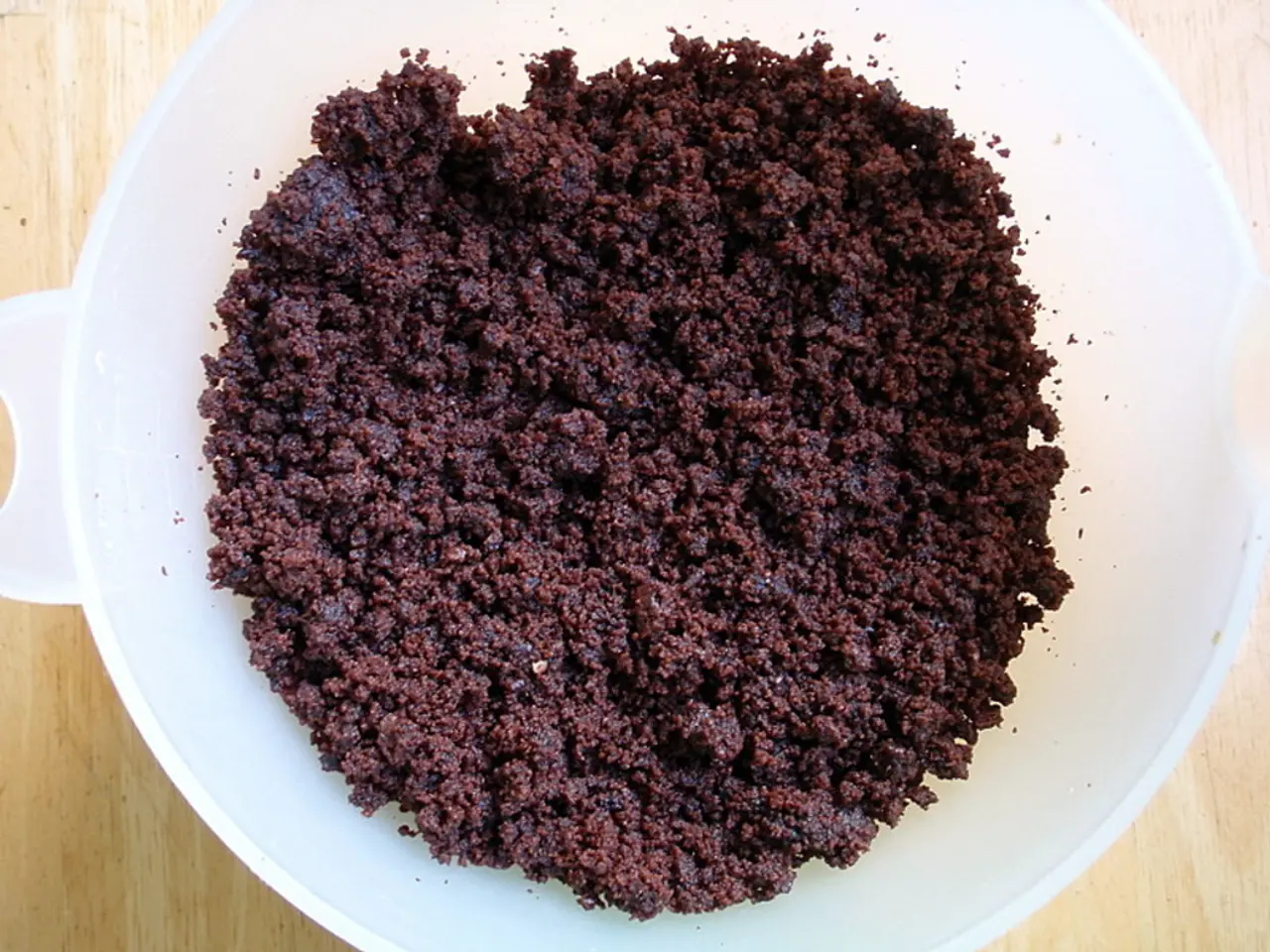Gastrointestinal complications: Connection, reasons, indications, remedies
Gastroesophageal Reflux Disease (GERD) and Irritable Bowel Syndrome (IBS) are two common functional gastrointestinal disorders that often coexist, sharing underlying dysfunctions such as stress, gut-brain axis disturbances, and altered gut motility [1][3].
Both conditions can cause frequent diarrhea, abdominal pain, bloating, and changes in bowel habits [1][3]. IBS, in particular, affects around 40% of the population [6]. Interestingly, people with IBS are four times as likely to also live with GERD [5].
Proton pump inhibitors (PPIs), a common treatment for GERD, may contribute to the development or worsening of IBS symptoms. PPIs reduce stomach acid to alleviate GERD symptoms, but over time, this can lead to hypochlorhydria (low stomach acid), impairing digestion and allowing bacterial overgrowth, such as Small Intestinal Bacterial Overgrowth (SIBO) or Intestinal Methanogen Overgrowth (IMO) [2][4]. These conditions are known to worsen IBS symptoms like bloating, gas, diarrhea, and constipation.
Moreover, PPI therapy can lead to rebound acid hypersecretion after stopping medication, creating a cycle of acid imbalance and altered gut environment that increases gut symptoms [2]. The disruption of normal gut flora from PPI use or associated antibiotic treatments for H. pylori can make the gastrointestinal tract prone to dysbiosis, further linking PPIs with IBS symptom exacerbation [2][4].
Stress and emotional health also play a significant role in both conditions, increasing symptom severity through neuro-gastroenterological pathways [1][3][5]. Changes in gut microbiota and gut dysbiosis (imbalanced microbial populations) contribute to IBS symptoms and can worsen GERD symptoms [3][4].
If lifestyle changes do not help manage diarrhea and heartburn, it is advisable to consult a doctor for further tests and management strategies. Strategies to prevent both diarrhea and heartburn include eating on a regular schedule, eating frequent small meals, stress management, limiting caffeine, avoiding spicy and high-fat foods, managing stress, avoiding tight-fitting clothes, and lying down after the last meal with the head elevated [7]. Different treatments are available for both diarrhea and heartburn, depending on the frequency and severity of symptoms.
A study from 2019 explored the potential link between the use of proton pump inhibitors (PPIs) and the development of Irritable Bowel Syndrome (IBS) [4]. Given the shared pathophysiological mechanisms and potential drug-induced complications, it highlights the importance of careful management and possibly addressing gut microbiota alongside acid suppression in patients with coexisting GERD and IBS.
References:
[1] Camilleri M, et al. Gastroenterology. 2015;148(4):873-887. [2] Chey WD, et al. Gastroenterology. 2015;148(7):1448-1459.e7. [3] Longstreth GF, et al. Am J Gastroenterol. 2006;101(9):1830-1845. [4] Tack J, et al. Gastroenterology. 2019;156(6):1302-1315. [5] Talley NJ, et al. Am J Gastroenterol. 2015;110(11):1771-1780. [6] Cui L, et al. World J Gastroenterol. 2017;23(13):2440-2450. [7] Mayo Clinic. Irritable Bowel Syndrome: Lifestyle and Home Remedies. https://www.mayoclinic.org/diseases-conditions/ibs/lifestyle-and-home-remedies/txc-20223230. Accessed 2022-03-23.
- The digestive system, especially the gastrointestinal tract, can be affected by various chronic medical conditions such as Gastroesophageal Reflux Disease (GERD) and Irritable Bowel Syndrome (IBS).
- GERD and IBS are functional gastrointestinal disorders that share underlying dysfunctions like stress, gut-brain axis disturbances, and altered gut motility.
- About 40% of the population is affected by IBS, a condition that increases the likelihood of coexisting GERD by four times.
- Common symptoms of both GERD and IBS include frequent diarrhea, abdominal pain, bloating, and changes in bowel habits.
- Proton pump inhibitors (PPIs), used to alleviate GERD symptoms, can contribute to the development or worsening of IBS symptoms.
- PPIs reduce stomach acid, leading to hypochlorhydria (low stomach acid), which impairs digestion and allows bacterial overgrowth, exacerbating IBS symptoms.
- Bacterial overgrowth conditions like Small Intestinal Bacterial Overgrowth (SIBO) or Intestinal Methanogen Overgrowth (IMO) can worsen IBS symptoms.
- Over time, rebound acid hypersecretion after stopping PPI medication can create a cycle of acid imbalance and altered gut environment, increasing gut symptoms.
- The disruption of normal gut flora from PPI use or associated antibiotic treatments can make the gastrointestinal tract prone to dysbiosis, further linking PPIs with IBS symptom exacerbation.
- Stress and emotional health play a significant role in both GERD and IBS, increasing symptom severity through neuro-gastroenterological pathways.
- Changes in gut microbiota and gut dysbiosis contribute to IBS symptoms and can worsen GERD symptoms.
- If lifestyle changes do not help manage diarrhea and heartburn, a doctor should be consulted for further tests and management strategies.
- Strategies to prevent both diarrhea and heartburn include eating on a regular schedule, eating frequent small meals, stress management, limiting caffeine, avoiding spicy and high-fat foods, managing stress, avoiding tight-fitting clothes, and lying down after the last meal with the head elevated.
- Different treatments are available for both diarrhea and heartburn, depending on the frequency and severity of symptoms.
- A study from 2019 explored the potential link between the use of proton pump inhibitors (PPIs) and the development of Irritable Bowel Syndrome (IBS).
- Given the shared pathophysiological mechanisms and potential drug-induced complications, the study highlights the importance of careful management and addressing gut microbiota alongside acid suppression in patients with coexisting GERD and IBS.
- In addition to GERD and IBS, other chronic medical conditions such as atopic dermatitis, psoriatic arthritis, asthma, Crohn's disease, ulcerative colitis, and chronic kidney disease have been linked to altered gut microbiota.
- Type-2 diabetes, eye health, health and wellness, workplace-wellness, fitness and exercise, climate change, mental health, skin care, and even neurological disorders have interconnections with gut health and microbiota.
- Therapies and treatments, including nutritional interventions and migraine therapies, can influence gut health and microbiota.
- Environmental science research is increasingly focusing on the impact of climate change on the incidence and severity of various skin conditions.
- Space and astronomy studies are revealing interesting connections between gut health and microbiota with our understanding of the origins and evolution of life on earth and beyond.
- By understanding the complex interplay between the gut, microbiota, and various chronic diseases, researchers hope to develop more predictive and personalized approaches to both prevention and treatment, ultimately improving overall health and well-being.




